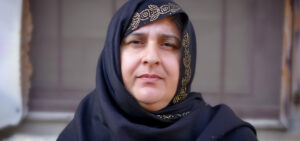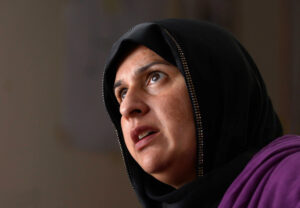When she was just 13, Tabassum Adnan was forcefully married to a man 30 years her senior. Unfortunately, her case was not an exception, as child marriage was and still is traditional in the society she was born into. Girls are forced into an early-age marriage and expected to be obedient wives. They must follow these patriarchal norms – otherwise, they are risking their lives.
Tabassum Adnan’s marriage, full of suffering, physical and mental abuse, ended after 20 years, when she finally got up the courage to get a divorce, despite the risks of being killed in the name of honor or being accused of having an affair. Those were terrifying prospects, but Adnan got herself together and was determined to fight for herself and other women.
“I was in court pursuing my case when a woman was stabbed and killed there, in front of the police. The man just surrendered, shouting loudly: “Honor! Honor!” He was arrested and then freed after some time,” Ms. Adnan recalls. “Another woman was beaten to a pulp and the culprit again went free after a while. I knew two girls who had tried to fight for their rights and committed suicide. I think they were killed, and to avoid any litigation it was framed as a suicide. I was in a state of trauma because of my situation and the situation of the women around me; it haunted me wherever I would go.”
At that time, Tabassum Adnan was a volunteer for a small organization collecting data from newspapers. Shockingly, every fifth article was about violence or murder of women. She counted 164 suicides of young girls within only a month. She dug deeper and found out that 162 cases out of those 164 were actually cold-blooded murders in the name of honor; 3 murders were for dowry. Adnan took the next step and founded the first ever women jirga in Pakistan, in 2013.
Jirgas are traditional informal councils whose decisions are socially respected and often impact the judiciary. Most of the time the decisions of jirgas are made against women, without considering their opinion. Quite often, disputes between families are settled by giving away a girl child and marrying her off to an older man from the other clan. Every head of a jirga is known as a ‘Mashra,’ meaning ‘elder’ or ‘leader’ in Pashto, and so Adnan became the first female ‘Mashra’ of a jirga in Pashtun history. Ms. Tabassum and her Khwedo Jirga (‘Sister’s Council’) stand for women and girls, trying to stop heinous cases and crimes against women.
“We have a range of cases, from property disputes to domestic violence, from murders to severe forms of violence. We had a case when a woman’s nose was chopped off by her husband, and our Jirga helped her by putting her offender behind the bars. We also provided her with medical assistance to go through multiple surgeries. Another case was when a husband chopped off his wife’s leg. We not only put him in a jail but also succeeded in getting a compensation of 6 million Pakistani rupees for the woman,” says Tabassum Adnan.
In 2014, for the first time in Pashtun history, Adnan was asked to sit on a male jirga, and that changed the public perception of Adnan and her work. It happened after a minor was raped, and the authorities failed to act, so Khwendo Jirga organized a protest walk. In the end, the suspects were arrested. Since that first success with a men’s jirga, Adnan has been invited to participate in dealing with other cases as well. Khwendo Jirga itself was recognized by the society, and women discovered they could ask it for help with their issues. Over the years, Adnan’s jirga has successfully resolved 2,043 cases.
Khwendo Jirga has been a beacon for many women and even men who come there for justice, which is a milestone in the history of Pakistan. Despite personal risk, Mrs. Adnan never hesitates to stand up for the rights of every member of her community, supporting both women and men and advocating for sexual, religious and any other minorities in her society. She is there for anyone in trouble. The women jirga in Pakistan has been instrumental in launching the Dispute Resolution Councils (DRC) at police stations, an alternate dispute resolution mechanism to provide free and speedy justice for the people and to maintain peace in the society. The DRCs, or so-called government jirgas, are comprised of civil society members, including at least one or two women. This is another serious step forward in a patriarchal society, and this is mainly an achievement of Tabassum Adnan and her jirga.
As a women’s rights defender, Tabassum is often receiving death threats and has also survived an assassination attempt, when a bullet missed her head by mere centimeters. Nevertheless, she continues to pursue justice for everybody, especially for women: “Child marriages are now unlawful, and one can be imprisoned or fined for it, but still there are lacunas in the law, which needs to be corrected. Due to COVID-19, there is a raise of EFM [Early and Forced Marriage] and it still needs to be addressed more than ever before,” says Ms. Adnan when asked about the difficulties caused by the pandemic. “Domestic violence has increased, and neither I can reach them [women], nor they can reach me. I pray and hope that COVID-19 ends soon, or we all become immune to it.”
Tabassum Adnan is grateful for every single life saved through her efforts and for a chance for women to not be deprived of their motherhood, as she has been. When she divorced her husband, she couldn’t keep her four children by her side and was forced to leave them with her ex. “When a woman gets justice with my efforts, I see it as if justice is being done to me. The mother inside me would weep and always tell me that she wants her children back. I would calm her down by telling her that one day, we are going to get our kids back and that I am going to lash the “patriarchal system” that stands between a mother and her kids. I promised to the mother inside me that I would bring the patriarchy to its knees!”
Ms. Adnan continues to be a target of extremist forces. Quite recently, she received two threat letters from extremists, warning her to abandon her cause or face dire consequences. Additionally, she has received several anonymous calls urging her to distance herself from what they deem ‘anti-Islamic’ activities. In response, the Khyber Pakhtunkhwa police have provided her with 24-hour security. Despite these threats, Ms. Adnan continues her work, inspiring and empowering women while advancing the cause of a more just and equitable society.
The information on this page was last updated on 11-08-2024 and was provided by the Luminary.


